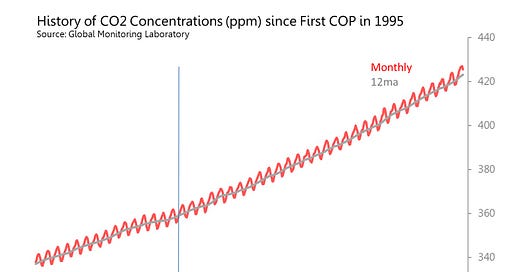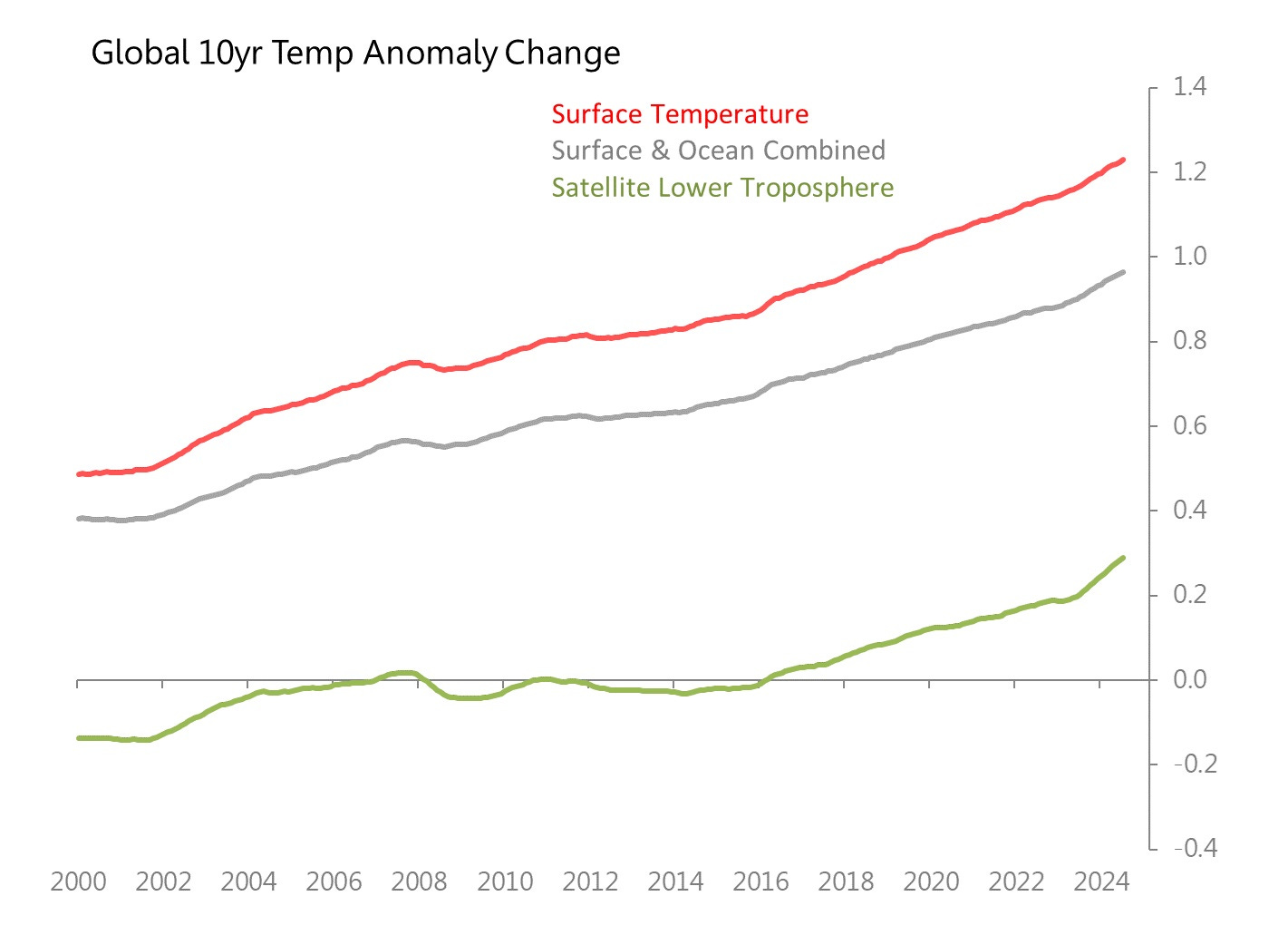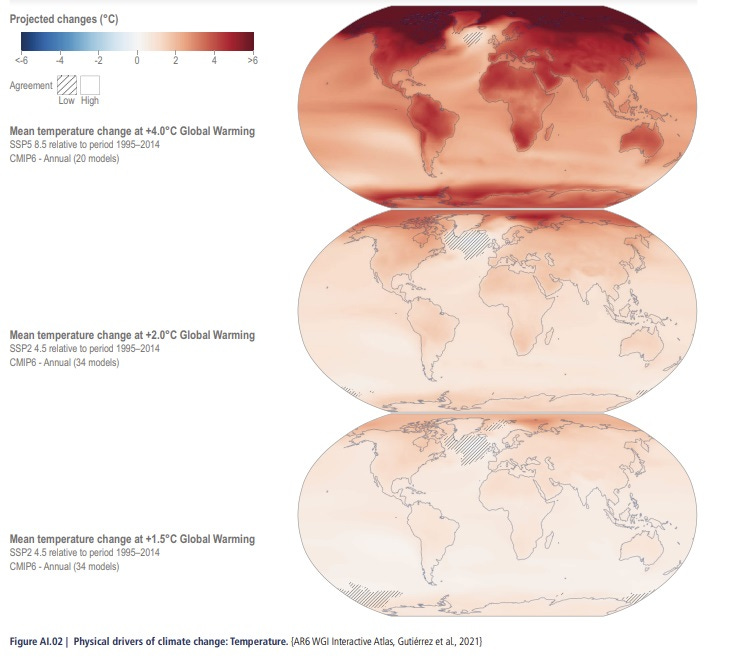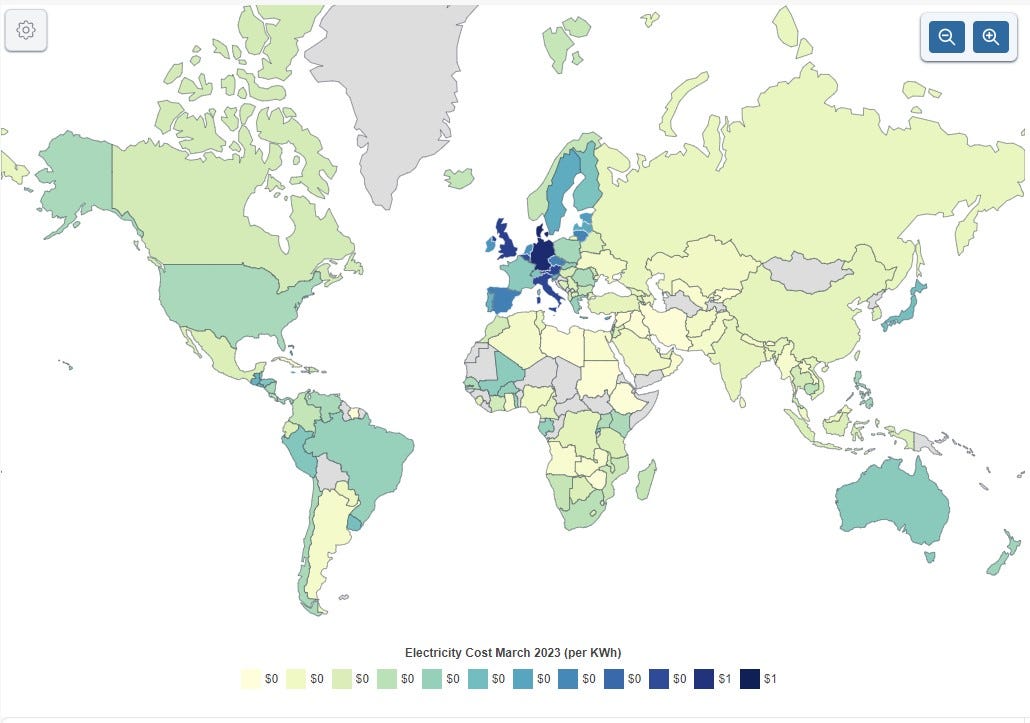The question is put in all seriousness: is Ed Miliband’s understanding of the world compatible with what we know about how it actually is?
(I delayed publishing this, because it seemed a bit extreme, a bit unseemly. But actually, I think the question needs to be asked, and answered. Still, apologies if I offend.)
Like his fellow zealots, Mr Miliband seems to think we live in a in which the great nations of the world compete in the carbon-cutting Olympics. Indeed, read the Climate Change Committee’s reports and inevitably you read about how ‘the UK can benefit from the international influence of setting a bolder target.’ Given sufficient will-power and enough money from the people who pay taxes and energy bills, Mr Miliband can transform Britain into a ‘Clean Energy Superpower.’
Britain a Superpower! Sounds great. Doubtless the first lemming over the cliff was proud of his leadership qualities.
But the world of Miliband’s imagination has no connection to the world we actually live in. It is not one of lemmings. Consider, for example, the pre-occupations of the world’s most populous country: India. India, by the way, is already the world’s third-largest CO2 emitter after China and the US.
India’s apex public policy think-tank, chaired by PM Modi, is not shy about its ambitions. Let me give you some idea of its plans: “The GDP would have to grow nine times from today’s US$3.36 trillion and the per capita income would need to rise 8 times from today’s $2,392 per annum,” reads its 'Vision for Viksit Bharat @ 2047:An Approach Paper'. To get there, the paper lays out strategy and actions plans for seven years, and 15yrs. Those plans give details of what India is trying to achieve in a range of sectors, but at the core is, as you would expect, transforming its vast population from agriculture to industry.
An impressive number of issues and sectors are examined in detail. What’s missing? You guessed it. Alas, poor Miliband, as India works to cement itself (sic) as a genuine superpower, it is not focused on cutting its carbon emissions or reliance on fossil fuels. In fact, right now its shipbuilders are discussing a consortium to build India’s own fleet of supertankers, just to make sure that its continued oil trade (with Russia, often) does not face the threat of Western sanctions. India emphatically isn’t competing in the Net Zero Olympics.
But why pick on India? The evidence is quite inescapable that all the fine words about ‘tackling climate change’, all the conferences, all the taxes and subsidies, all the public campaigning and political bullying of Western obsessives, has achieved very little, if anything. Indeed, the only way you can imagine it has achieved anything at all is by deploying hypotheticals - ‘it would have been so much worse. . . ‘
The data is unequivocal: there’s not been the slightest downward deflection in global CO2 concentrations since the first COP meeting in 1995. Can you see any evidence that the approach is working? I can’t.
What would be a reasonable reaction to this chart? Mine is: ‘If CO2 is driving global warming, then the battle is already lost, and we need to start facing up to that.’ What I think is not a reasonable response is: ‘OK, but one more Big Push will do the trick’.
That would be reasonable if all the efforts of the last 30 years hadn’t failed so utterly.
None of this is to say that global warming is not a problem. It is, and I think the hypothesis that rising CO2 concentrations are involved is very persuasive, even though anyone who has dabbled in stock/flow simulation modelling will know how difficult/dangerous these models can be.
But the problem, as far as the Miliband question is concerned, is that:
Britain isn’t the global problem;
Britain cannot be the global solution;
Britain is amongst the most-protected nation in the world against global failure to tackle the problem.
Britain Isn’t the Global Problem
Britain’s contribution to annual CO2 emissions is famously already negligible, coming in a 0.88% of global emissions in 2022. https://en.wikipedia.org/wiki/List_of_countries_by_carbon_dioxide_emissions
Per capita each Briton emits 5 tons of the stuff a year, which is not only lower than the EU average of 6.32 tons (Germany 8.16 tons), but is also now about where we were in the 1850s. (India is on 1.91 tons pa, but they’re working on it.)
So let’s play ‘Spot the Emitter’. Here’s the graphic from 2017. Can you spot the UK without zooming in? You can’t: the UK is just 10% of the EU-28 block. If you can spot Australia (purple, bottom right), the UK is about 90% of that block.
Britain Isn’t the Global Solution
At less than 1% of global emissions, nothing Britain can do, including going beyond Net Zero and eliminating the entirety of its emissions, can be more than a rounding error in global CO2 emissions. It will make, can make, no difference whatsoever in uninterrupted rise in CO2 atmospheric emissions. (A 2019 presentation was ironically accurate with its title: ‘Net Zero. Britain’s contribution to stopping global warming’.) Britain will make, can make, no difference at all to the fate of global temperatures. Net zero.
Britain Is Unusually Protected Against Global Warming
What is also ironic is that, as far as climate modelers know, Britain will be one of the countries least affected by global warming. Here’s how the IPCC envisages the distribution of rising global temperatures under average rises of 4 degrees, 2 degrees and 1.5 degrees.
It is uncanny: under even the most extreme warming scenarios Britain is probably the least-affected country in the world. Much of the rest of the world heats: Britain doesn’t much. Sorry, we’re still going to be a pretty cold island.
Net Zero: Meaning and Purposeful In All the Wrong Ways
Although Britain cannot contribute meaningfully to changing the fate of global CO2 emissions and/or global temperature, that does not mean that the strenuous and expensive efforts to reach ‘net zero’ are meaningless or pointless. It’s just that the meaning is at odds with rational analysis, and the point is that it will impoverish the country, thus making adaptation to climate change more challenging when the time comes.
Miliband endlessly repeats the myth of ‘cheap renewable energy’: maybe having re-iterated it incessantly he has come to believe it. Once again, the problem is that in the real world, as Britain’s reliance on renewable energy has risen, so Britain’s electricity prices have soared. In 2010, a kWh of electricity sold for 12.7p; in 2024, the average so far is 24.99p. That’s a rise of 97%. Meanwhile, in 2010 a barrel of Brent crude sold for $79.8: this year its average price is $82.5. That’s a rise of 3.4%.
So in the price of power game, British electricity’s 97% plays global oil’s 3.4%. Meanwhile, the proportion of electricity generated by ‘renewables’ rose from 6.9% in 2010 to 46.4% in 2023. (Nb, note that these ‘renewables’ include the contributions from DRAX, which in an impressive display of eco-Jesuitical arguments manages to classify burning North American forests, including old growth forests, as ‘green and renewable’. Burning ‘plant biomass’ was responsible for 8.1% of all ‘renewable’ generation last year). Source: https://www.gov.uk/government/statistics/energy-trends-section-6-renewables
We all have to pay for this expensive energy, either directly, or through higher prices of all goods and services. What has this ‘cheap renewable energy’ done to overall business costs? Astonishingly, we don’t know, because when the ONS produces the monthly Producers Price Index, although it breaks down manufacturers’ costs in considerable detail, it excludes all mention of, and measurement of, the Climate Change Levy raised on all power production (and consequently purchase), including the Carbon Support Price.
What we do know, however, is that the cost of attempting to be a ‘Clean Energy Superpower’ has been among the highest electricity costs in the world. The World Population Review finds that in the entire world, only Denmark and Germany charges its customers more for electricity. But since Denmark’s per capita GDP 39% higher than the UK’s, and Germany’s is 8% higher, perhaps their electricity prices aren’t quite so burdensome.
But these are average costs: for industrial users, the news is worse - much worse.
Let that sink in, Britain’s industrial companies are now paying more than three times what is paid in the US, and 46% more than they pay in Germany.
It is as if there is a concerted political campaign to eradicate British industry, and the jobs they support, entirely.
It’s Going to Get Worse, Soon
It is not going to get any better: in fact, the equations are getting more difficult by the day, as interest rates rise. ‘Renewables’ after all, are heavy on the fixed (capital) costs, but very cheap on variable costs (and can be made even cheaper if you cheat on the depreciation schedule). Fossil fuels, are light on fixed (capital) costs, but expensive (not very, see above) on variable costs. So when the cost of capital rises, ‘renewables’ get more expensive. This is why the price guaranteed to wind-power ventures (and consequently, the price you pay for electricity) is now being pushed higher. Without being guaranteed higher prices, contractors are no longer interested, which is why auctions for new projects failed last year.
This September, however, it was a different story, because the guaranteed price was raised, to an estimated £82.60 and £89.70 pounds/MWh in 2027. So if we’re lucky, that’ll be 20% higher than today’s price, and if we’re not lucky, 30% higher.
Who could possibly believe that renewables are the path to cheap energy? Answer: Miliband. So the question really is: is he in his right mind?
There is confusion about Mr Miliband’s attitude towards North Sea oil and gas production, with initial reports that he had banned all new drilling licenses officially denied. But more recently he has said that he will not resist legal challenges brought by Greenpeace against licenses issued for the Rosebank and Jackdaw oil fields. If that puts those projects in danger, it seems that’s OK with Mr Miliband.
But discouraging Britain from using the energy resources we possess is senseless. If stop drilling there in the North Sea we will have to buy our petrochemicals from overseas.
From an economic point of view, it doesn’t bear even the slightest scrutiny: it’s just sheer purposeless loss, sheer pointless impoverishment of the nation. Let’s put some numbers on that: last year, we exported £38.558bn worth of fuels and imported £80.358bn, so Britain’s trade in fuels generated a £41.8bn deficit. Overall, Britain had a deficit in trade in goods of £186.7bn, so the fuel deficit accounted for 22% of the total deficit. In fact, because Britain has a surplus of services, our total deficit in traded goods and services came to only £33.38bn. Britain’s deficit in trade fuels alone was larger than the overall trade deficit!
If Miliband managed to shut down North Sea production (which, thank God, seems unlikely), that would be £38.5bn off exports and, one assumes, £38.5bn on imports. The fuel deficit alone would therefore grow by £77bn, from £41.8bn to to approximately £118.5bn! Ruinous. Who in their right mind would propose such a thing?
Estimate of Costs
How much would it cost the UK to reach net zero? Back in 2021, the Office for Budget Responsibility added up the gross costs and came to a figure of £1.4tr (context: current UK GDP is £2.74tr). The provoked howls of anger, but the Climate Change Committee, packed with true believers, also estimated the gross costs between 2020 to 2050 at £1.312try, but claimed that this would be mainly offset by £991bn of net operating savings.
With those operating savings banked, the net costs comes down to a mere £321bn (context: total public sector borrowing right now is running at £108bn pa; total VAT receipts c£211bn, total income tax receipts £340bn).
Who really knows? No-one. Here’s what the Climate Change Committee’s Advisory Group on Costs and Benefits of Net Zero has to say:
“Both the costs and benefits of deep decarbonisation are unknowable with any precision. They depend too fundamentally on deeply uncertain outcomes, such as the damages from climate change in the long term, and the evolution of the costs of low-carbon technology over several decades. The very word ‘costs’ to describe decarbonisation expenditures is somewhat misleading, because in a very real sense such expenditures are also investments – both in new industrial activities, and in achieving the benefits of a stable climate.”
What you won’t find in their 59 page report (here, if you want it) is any explanation of those net operating savings the CCC relies on to bring their planned spending (‘in a very real sense . . . investments’) back to the realms of graspability. Rather, they nebulously simply assume uncosted ‘(avoided) climate damage costs, (avoided) climate, adaptation costs, (avoided) other damage costs, e.g. air pollution.’ Reassured?
But as well as the unknowable direct costs, and indirect costs to the economy by crowding out other potentially more productive investments, there are indirect costs to householders from the pursuit of net zero. It would be interesting to total up the covert costs already involved, in terms of attempts to enforce purchase of net-zero oriented products such as heat pumps and electric vehicles, and taxes on net-zero disapproved behaviour such as private transport of all sorts.
It also seems very likely that net zero’s general assault on freedoms will expand to discouraging or punishing ‘unhelpful’ pieces such as the one you are reading. Quite possibly pieces like this will be condemned as ‘misinformation’ or even be subject to a ‘non-criminal hate’ investigation. This is why all the figures in this piece are attributed to source: truth, I think, should be a comprehensive and definitive defence.
Still, that caution highlights the other insidious cost of Britain’s pursuit of ‘net zero’: mired as it is in lies, deflection, coercion and burial of the costs involved, the machinations surrounding net zero but erode the trust in the political process which demands and furthers these behaviours. Quite simply, net zero corrodes and degrades the nation.
In the end, the type of zealotry pursues suggests Ed Miliband inhabits a world quite divorced from measurable reality in a number of important ways. I will not speculate as to the how and why, but William Ockham might be less hesitant. The important question for Britain is how long he will be suffered to pursue his expensive and pointless goal? How long will Sir Keir Starmer Sue Gray allow him to go on?









As in all things, there is the usual range of motivations behind this lunacy. Some mad, some bad and everything in between. I suspect Milliband & his ilk really think they are doing good and will be seen as long sighted saviours of mankind. The stronger the pushback, the more entrenched their position becomes.
Reality? That doesn't matter. As long as these fantasists can Virtue Signal to their peers they don't care about reality or truth.
The Climate Change Committee are deeply compromised. Most of the members have connections to the renewables industry, not that you needed me to tell you that 🤣